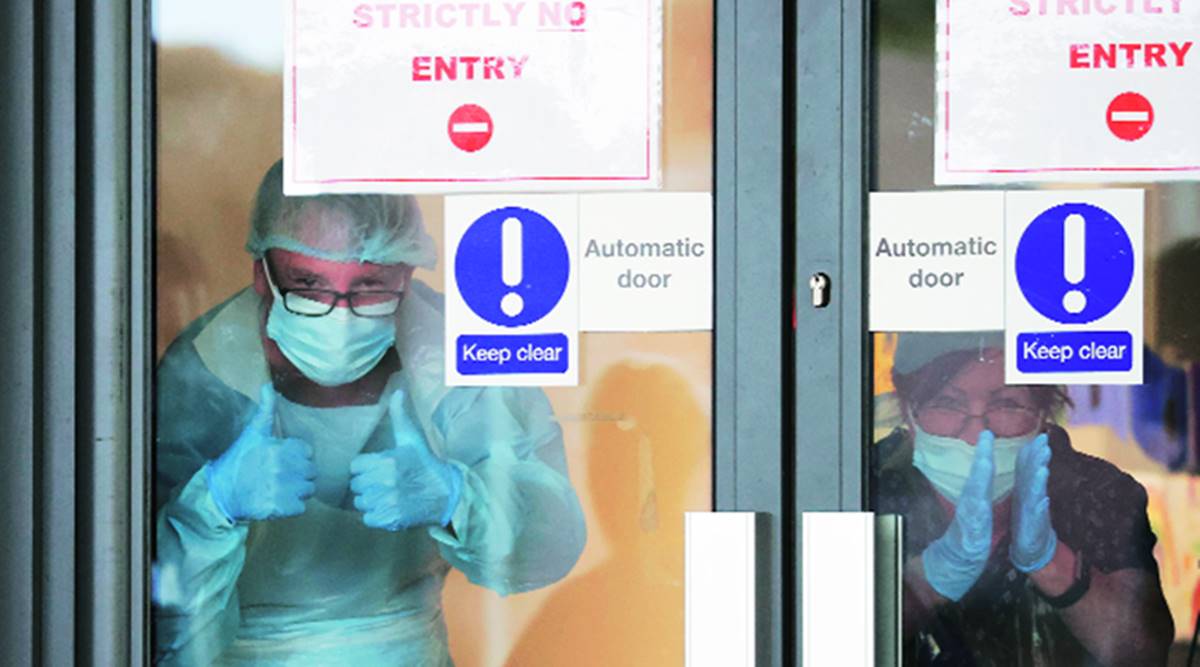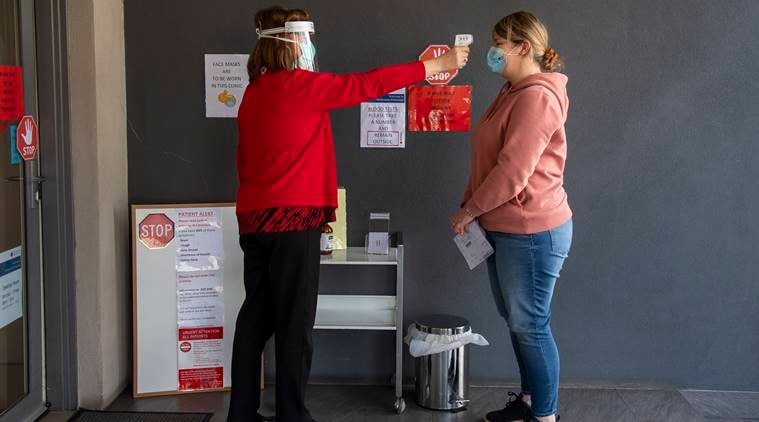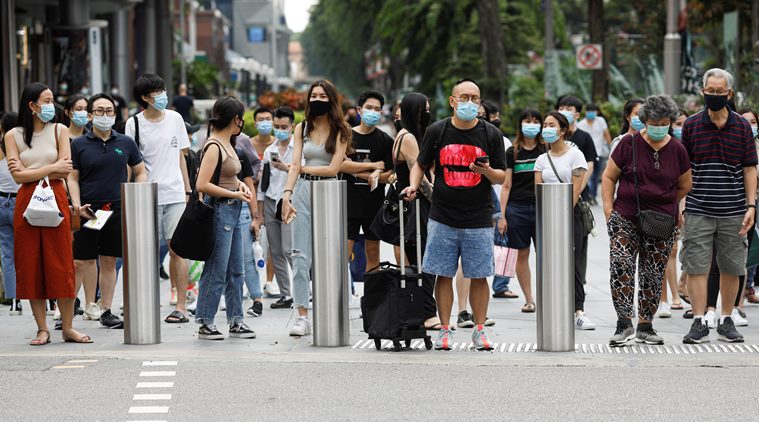 NHS workers at a hospital in Liverpool. (Photo: Reuters)
NHS workers at a hospital in Liverpool. (Photo: Reuters)Coronavirus Global Updates: The number of people infected by the coronavirus pandemic is inching closer to the 30 million mark across the world with over 29.27 million current infections. The second waves reported from Australia to Isreal to China have slowed down the efforts in curbing the virus that has taken a heavy toll on world economy.
At least 926,716 people have died after testing positive. United States continues to lead the world with over 6.5 million cases and over 1.94 lakh deaths. India, second after the United States is inching closer to 5 million cases.
Meanwhile, United Nations Secretary-General Antonio Guterres will use his annual address to world leaders next week to push for a “global ceasefire” until the end of 2020 so countries can fight the coronavirus pandemic.
Here are some global developments on Covid-19
France fast-tracks citizenship for foreign virus fighters
France is to reward foreign health care-workers and other front-line personnel who distinguished themselves in the fight against COVID-19 by fast-tracking citizenship applications for those who want to become French.
Instructions this week from the Interior Ministry, seen by The Associated Press, ordered regional officials to prioritize naturalization requests from foreigners who “actively participated in the national effort, with devotion and courage” against the epidemic that has killed nearly 31,000 in France.
Signed by Marlene Schiappa, the ministry official in charge of citizenship issues, the circular says foreigners who are eligible can be naturalized after just two years of residency in France, instead of the usual minimum of at least five years, because of the “important services” they rendered. It specifically mentioned health-care workers.
The circular did not further specify eligibility criteria, or how many people might benefit from the decision. “The recognition, by France, of those who spared neither their efforts nor courage is essential to salute an exceptional commitment,” Schiappa wrote. “Our country was able to count on their solidarity and generosity in the face of this immense challenge.” (AP)
Shortage of COVID-19 testing hurts efforts to fight 2nd wave
A shortage of COVID-19 testing in the UK is jeopardising efforts to restore medical services and prepare for a potential surge in coronavirus cases this winter, the group that represents hospitals in England said Tuesday.
Inadequate testing is leading to increased absences in the National Health Service as staff members are forced to self-isolate while they and their family members wait for test results after possible exposure to the virus, according to NHS Providers.
Last weekend hospital leaders in three different cities raised concerns about testing, said Chris Hopson, the group’s CEO.
“The problem is that NHS trusts are working in the dark – they don’t know why these shortages are occurring, how long they are likely to last, how geographically widespread they are likely to be and what priority will be given to healthcare workers and their families in accessing scarce tests,” Hopson said in a statement.
The shortage comes amid a surge in COVID-19 cases across the UK that has pushed daily positive tests to levels last seen in late May and forced the government to impose new controls on public gatherings.
UK study to trial vaccine delivery through inhalers
A small coronavirus clinical study has been launched in the UK this week to explore the effects of delivering vaccines directly to the body’s airways using an inhaler.
Imperial College London researchers said they will assess the safety and effectiveness of two of the UK’s coronavirus vaccines in development when inhaled into the lungs.
The team will compare COVID-19 vaccine candidates being developed by both Imperial College London and Oxford University, delivering the vaccines directly to the respiratory tract of human volunteers, by inhalation through the mouth.
“We have evidence that delivering influenza vaccines via a nasal spray can protect people against flu as well as help to reduce the transmission of the disease. We are keen to explore if this may also be the case for SARS-CoV-2 and whether delivering COVID-19 vaccines to the respiratory tract is safe and produces an effective immune response,” said Chris Chiu, head of the Imperial Network for Vaccine Research.
Germany boosts own vaccine makers in race for COVID jab
Germany says it is providing up to 750 million euros ($892 million) to support three domestic pharmaceutical companies that are developing vaccines against the new coronavirus. Science Minister Anja Karliczek said Tuesday that the government has already agreed to provide BioNTech and CureVac with 375 million euros and 230-million euros respectively to develop their mRNA-based vaccines.
Talks with a third company, IDT Biologika, are expected to conclude soon, she said. The company is developing a vector-based vaccine that delivers a coronavirus protein into cells to stimulate the body’s immune response.
The agreement with the three companies, which is tied to specific milestones, would guarantee Germany 40 million doses of vaccine. The amount comes on top of other vaccine supply agreements concluded through the European Union, of which Germany is a member.
Karliczek said Germany wouldn’t cut corners when it comes to testing vaccines, meaning most of the population may have to wait until mid-2021 to be inoculated.
“Safety is an absolute priority,” she said. (AP)
Dutch government to unveil budget overshadowed by virus
The Dutch government is unveiling its annual budget plans Tuesday, providing an indication of how one of Western Europe’s most prosperous nations foresees the ongoing economic impact of the coronavirus pandemic.
The budget announcement comes a day after the Organization for Economic Cooperation and Development said that the gross domestic product in the world’s 20 major industrialized nations dropped by a record 6.9% in the second quarter from the previous three-month period.
The Dutch statistics office said in August that the national economy suffered an unprecedented 8.5% contraction in the second quarter, calling it “an economic catastrophe of exceptional proportions.”
Measures to rein in the virus outbreak mean that the pageantry that normally accompanies the traditional state opening of Parliament has been dialed back significantly to ensure lawmakers adhere to the government’s social distancing guidelines.
Singapore reports 34 new cases of coronavirus: Health Ministry
Singapore has reported 34 new cases of coronavirus, taking the total number of infections in the nation to 57,488, the health ministry said on Tuesday. The Ministry of Health (MOH) said that six of the total cases are foreigners who travelled to Singapore recently and all of them have been put under home quarantine.
“With the 34 new cases, Singapore’s tally of coronavirus infections has surged to 57,488,” the MOH said in a statement. With 38 patients discharged on Monday, 56,802 people with the viral disease have fully recovered from the infection.
The MOH said 53 patients were still in hospital while 572 are recuperating in community facilities. (PTI)
S.Korea to secure coronavirus vaccines for 60% of population, says PM Chung
South Korean Prime Minister Chung Sye-kyun Tuesday said that the country will secure early supply of Covid-19 vaccines for 30 million people or 60% of its population. To ensure this supply the government will negotiate with international organisations and vaccine makers. Chung said while the authorities would like to provide a vaccine to the Republic’s entire population, uncertainty around the vaccine’s safety, efficacy and development was limiting this investment.
The Korea Disease Control and Prevention Agency reported 106 new coronavirus cases as of Monday midnight, which brought the total number of infections to 22,391, and the total COVID-19 death tally to 367.
China coronavirus vaccine may be ready for public in November, says official
 China has 4 Covid-19 vaccines in the final stage of clinical trials (AAP Image/James Ross via Reuters)
China has 4 Covid-19 vaccines in the final stage of clinical trials (AAP Image/James Ross via Reuters)
Coronavirus vaccines being developed in China may be ready for use by the general public as early as November, an official with the Chinese Center for Disease Control and Prevention (CDC) said on Monday. “Phase 3 clinical trials were proceeding smoothly and the vaccines could be ready for the general public in November or December” CDC chief Guizhen Wu said.
Currently, China has 4 Covid-19 vaccines in the final stage of clinical trials. Out of these, at least 3 of the vaccines have already been offered to frontline workers under an emergency use programme launched in July.
Australia’s Victoria reports no COVID-19 deaths in 2 months
 A patient has her temperature checked at a medical clinic during lockdown due to the continuing spread of the coronavirus in Melbourne. (AP Photo/Andy Brownbill)
A patient has her temperature checked at a medical clinic during lockdown due to the continuing spread of the coronavirus in Melbourne. (AP Photo/Andy Brownbill)
Victoria, Australia’s hotspot for the country’s second wave on Tuesday reported no deaths related to the coronavirus for the first time in 2 months, fuelling optimism of a further easing of restrictions in the state. Victoria last recorded zero COVID-19 death on July 13. Victoria, home to one-quarter of Australia’s population, now accounts for about 75% of the country’s more than 26,700 coronavirus cases and 90% of its 816 deaths.
The state’s capital Melbourne has been under lockdown which is now extended till September 28. But with the steady fall in cases, some restrictions were relaxed from Monday allowing people to leave their homes for longer periods and authorities shortened a night curfew.
Jordan issues new curbs, closes school after rise in cases
After registering a record spike in coronavirus cases in the last few days, Jordan has issued renewed restrictions for another two weeks that will include closing schools, places of worship, restaurants and public markets starting Thursday. The decision taken after a cabinet meeting came as the kingdom struggles to prevent the uncontrolled spread of the pandemic.
Health Minister Saad Jaber said the government was seeking to avoid the kind of tight nationwide lockdown imposed in the spring that brought the virus under control. “These measures are harsh as they are, but we hope they will reduce infections and prevent a large outbreak that would lead to a total shutdown that would have catastrophic consequences,” Jaber said
Pandemic’s global economic impact unlikely to worsen, Qatar commerce minister says
 People wait to cross a street at the shopping district of Orchard Road as the city state reopens the economy, amid the coronavirus disease (COVID-19) outbreak, in Singapore June 19, 2020. (REUTERS/Edgar Su)
People wait to cross a street at the shopping district of Orchard Road as the city state reopens the economy, amid the coronavirus disease (COVID-19) outbreak, in Singapore June 19, 2020. (REUTERS/Edgar Su)
Forecasting a recovery between a ‘U’ and ‘V’ shape, Qatar’s commerce minister Monday said that the global economy is unlikely to worsen due to the coronavirus pandemic even as countries face a second wave.
“I think we have already seen the (economic) impact (of the pandemic). Is it going to get worse? I don’t think so,” Commerce and Industry Minister Ali bin Ahmed al-Kuwari told Reuters. He highlighted that the governments are better equipped to deal with the virus than what they were initially and investments in health care and economies will bring countries back on track.
(With inputs from Reuters)
📣 The Indian Express is now on Telegram. Click here to join our channel (@indianexpress) and stay updated with the latest headlines
For all the latest World News, download Indian Express App.

